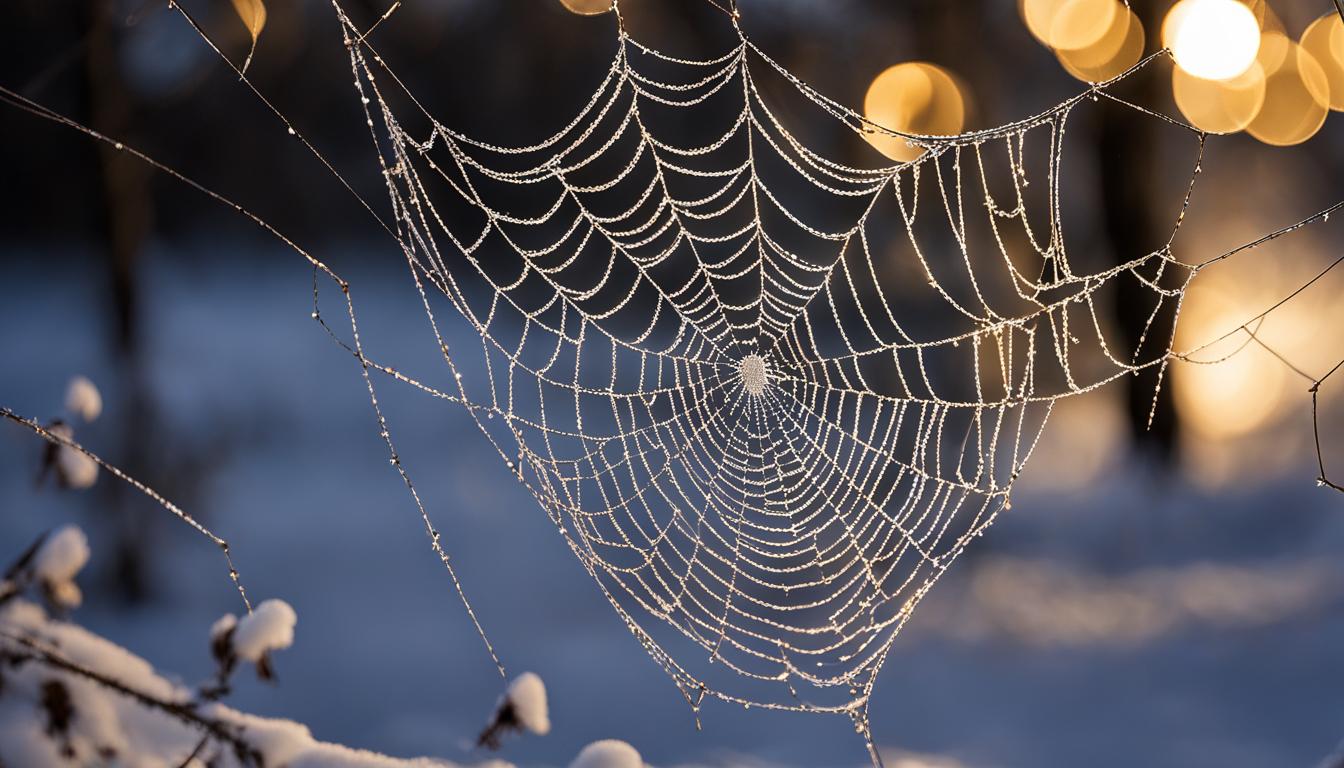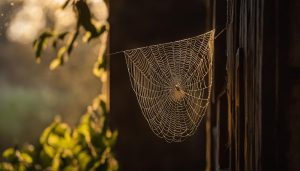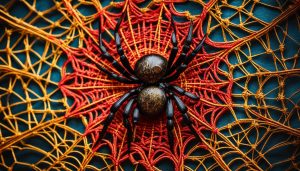Spiders and their webs have been associated with different meanings and interpretations in various cultures worldwide.
Spiders have played a significant role in folklore and traditions, from being seen as creators and destroyers to symbolizing good fortune.
But is it good luck to find a spider web on Christmas morning? Let’s delve into the age-old inquiry and uncover the truth behind this yuletide lore.
Contents
- 1 The Legend of the Spider and Christmas Trees in Ukraine
- 2 Spiders as Symbols of Creation and Destruction in Ancient Cultures
- 3 Spider Webs and Christmas Decorations in Germany and Ukraine
- 4 Spiders in Folklore and Traditions Around the World
- 5 Conclusion
- 6 FAQ
- 6.1 Is finding a spider web on Christmas morning considered good luck?
- 6.2 Where did the tradition of decorating Christmas trees with spider webs originate?
- 6.3 What are some other cultural beliefs and traditions surrounding spiders?
- 6.4 Why are spider webs incorporated into Christmas decorations in Germany?
- 6.5 What role do spiders play in art and mythology?
- 6.6 Are there any other spider legends and traditions from around the world?
- 6.7 What is the significance of spiders in human folklore and beliefs?
- 7 Source Links
Key Takeaways:
- Finding a spider web on Christmas morning has been considered a symbol of good luck in some cultures.
- The tradition of decorating Christmas trees with spider webs originated from a Ukrainian legend.
- Spiders have been associated with both creation and destruction in ancient mythologies.
- Spider web decorations are popular in Germany and other countries during the holiday season.
- Spiders hold diverse symbolism in different cultures and play roles in various folklore and traditions.
The Legend of the Spider and Christmas Trees in Ukraine
In Ukraine, decorating Christmas trees with spider webs is deeply rooted in folklore. According to a popular legend, a low-income family once couldn’t afford to adorn their Christmas tree.
However, on Christmas morning, they woke up to a magical sight – a spider had spun an intricate and beautiful web over their tree, transforming it into a breathtaking spectacle. This unexpected gift from nature was seen as a symbol of good luck and prosperity. Since then, it has been believed that finding a spider web on your Christmas tree brings blessings and abundance.
This enchanting tradition has captured the imagination of Ukrainians for centuries. It is common for families to decorate their Christmas trees with delicate spider web ornaments made of golden or silver thread.
Also read: Is it Good Luck to Find a Spider in Your New House?
These shimmering webs add a touch of elegance to the tree and serve as a reminder of the legend and the hope it brings for a fortunate year ahead.
Ukraine’s Christmas spider web tradition has gained recognition and appreciation worldwide. It showcases the enduring power of folklore to shape cultural practices and beliefs.
So, when you see a spider web glistening on your Christmas tree, remember the magical tale from Ukraine and embrace its joyous symbolism.
Table: Spider Web Decorations in Ukraine
| Decoration | Description |
|---|---|
| Spider Web Ornaments | Delicate ornaments made of golden or silver thread resembling spider webs. |
| Sparkling Gems | Decorative gems or beads are added to the spider web ornaments to enhance their beauty. |
| Christmas Tree Toppers | Spider-shaped tree toppers made of metal or glass symbolize good luck. |
| Spider Web Lights | String lights are designed like spider webs, creating a magical ambiance. |
Spiders as Symbols of Creation and Destruction in Ancient Cultures
Spiders have played a rich and varied role in ancient cultures, symbolizing creation and destruction. In Greek mythology, the story of Arachne portrays the duality of spiders as skilled weavers and destructive tricksters.
In a fit of jealousy, the goddess Athena turned Arachne into a spider, forever destined to weave intricate webs and roam the earth. This myth highlights spiders as symbols of creative skill and the potential for chaos.
Ancient Egyptian culture also saw spiders as symbols of creation. The spider was associated with Neith, the goddess of weaving and destiny.
Neith was often depicted with spider motifs, representing the intricate weaving of fate. This connection between spiders and creation is further emphasized in West African folklore, where spiders are trickster gods responsible for chaos and mischief.
The multifaceted nature of spider symbolism is evident in these ancient cultures, where spiders represent both creative power and the potential for destruction.
Their intricate webs and mysterious nature have captured the imagination of humans throughout history, making them enduring symbols in mythology and folklore.
Also read: Is It Good Luck To See a Spider on Halloween?
Weaving the Web of Symbolism
Spiders’ significance in ancient cultures can be attributed to their unique ability to weave intricate webs. With their delicate beauty and immense strength, these webs have become metaphors for the interconnectedness of life and the cycles of creation and destruction.
Spiders’ association with creation and birth in Egyptian culture and their role as trickster gods in West African folklore further underline their symbolic importance.
“Spiders are mysterious creatures, embodying both creative prowess and the potential for chaos. Their webs are intricate tapestries that connect the threads of existence.”
As humans, we are drawn to spiders’ ability to transform simple threads into architectural marvels, just as we are captivated by the delicate balance between creation and destruction they represent.
Whether we view them as bringers of fortune or cunning tricksters, the symbolism of spiders in ancient cultures continues to intrigue and inspire.
Spider Webs and Christmas Decorations in Germany and Ukraine
When it comes to holiday decorations, there are numerous traditions and symbols associated with Christmas. One such tradition that has gained popularity in both Germany and Ukraine is the use of spider webs.
These delicate and intricate structures have become a staple in Christmas decorations, adding a whimsy and charm to the festive season.
In Germany, the association between spider webs and Christmas can be traced back to the tradition of using tinsel, which closely resembles the strands of a spider web.
People believe incorporating spider webs into their Christmas decorations brings good luck and blessings for the holiday season. It has become common to see artificial spider webs adorning Christmas trees and homes, creating a magical and festive ambiance.
Similarly, decorating Christmas trees with spider webs in Ukraine dates back centuries. Legend has it that a low-income family who couldn’t afford to decorate their tree woke up on Christmas morning to find a spider had spun a beautiful web over it.
This event was seen as a symbol of good luck and prosperity, and since then, finding a spider web on your Christmas tree has been believed to bring fortune and blessings.
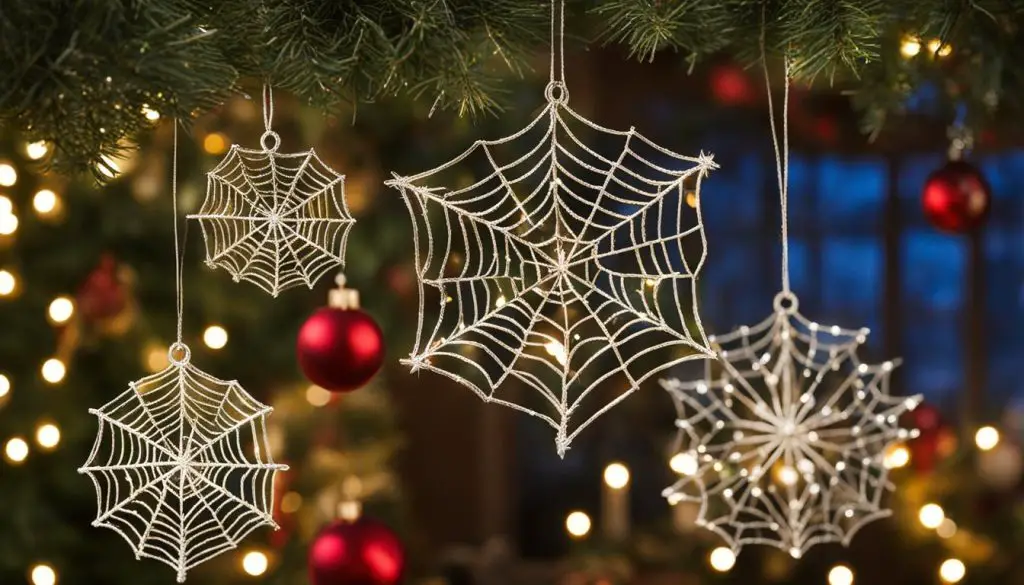
The Symbolism of Spider Webs in Christmas Traditions
Using spider webs in Christmas decorations symbolizes more than luck and prosperity. The intricate patterns of the webs represent the interconnectedness of family and community during the holiday season.
Families celebrate and create cherished memories as a spider builds its web by weaving together individual strands. The delicate beauty of the spider web reminds us to appreciate the small details that make the holidays unique.
As you decorate your home for Christmas, consider incorporating spider webs into your decorations. Whether through artificial webs or handmade ornaments, these delicate symbols can add a touch of magic to your holiday celebrations.
Embrace the rich traditions and folklore that have woven spiders and their webs into the fabric of Christmas traditions, and you may find yourself surrounded by good luck and blessings this holiday season.
Spiders in Folklore and Traditions Around the World
Spiders have long captured the imagination of people across different cultures, and their symbolism can vary greatly. In China, spiders are considered lucky creatures that bring wealth and happiness.
Japanese folklore tells tales of the Spider Princess, a seductive figure who lures unsuspecting warriors. Meanwhile, the Burning of the Devil ritual in Guatemala involves setting fire to a heap of rubbish, symbolizing the Burning of the previous year’s bad luck.
These examples highlight spiders’ diverse roles and meanings in different cultural contexts.
Throughout history, spiders have been associated with creation and destruction. In Greek mythology, the story of Arachne the weaver, who was turned into a spider by the goddess Athena, showcases the dual nature of spiders as creators and destroyers.
In Egypt, the spider was seen as a symbol of creation and birth. In West African folklore, spiders were trickster gods responsible for mischief and chaos. These myths and legends emphasize the complex and multifaceted symbolism attributed to spiders in ancient cultures.
“Spiders have held a significant place in human imagination and folklore worldwide.”
Spiders and their webs have also become part of cultural traditions and celebrations. In Ukraine, it is customary to decorate Christmas trees with spider webs, which are believed to bring good luck and prosperity.
Germany has a similar tradition, with spider webs incorporated into Christmas decorations as a symbol of blessings. These practices have spread to other countries, where people adorn their homes and Christmas trees with artificial spider webs.
The association between spiders and good fortune during special occasions highlights these creatures’ enduring symbolism and importance in our cultural rituals.
Spider Symbolism in Different Cultures
Spider symbolism varies across different cultures and can represent various ideas and beliefs. Spiders are associated with cunning and trickery in some cultures, while they symbolize wisdom and creativity in others.
The spider’s ability to create intricate webs has often been admired and linked to human endeavors in weaving and craftsmanship. From ancient myths to modern festivities, the spider’s presence in folklore and traditions reminds us of the rich tapestry of human imagination and the enduring allure of these fascinating creatures.
| Culture | Spider Symbolism |
|---|---|
| China | It brings wealth and happiness |
| Japan | Matchmaking creatures |
| Guatemala | Symbolizes burning of bad luck |
| Greece | Creators and destroyers |
| Egypt | Symbol of creation and birth |
| West Africa | Trickster gods of mischief and chaos |
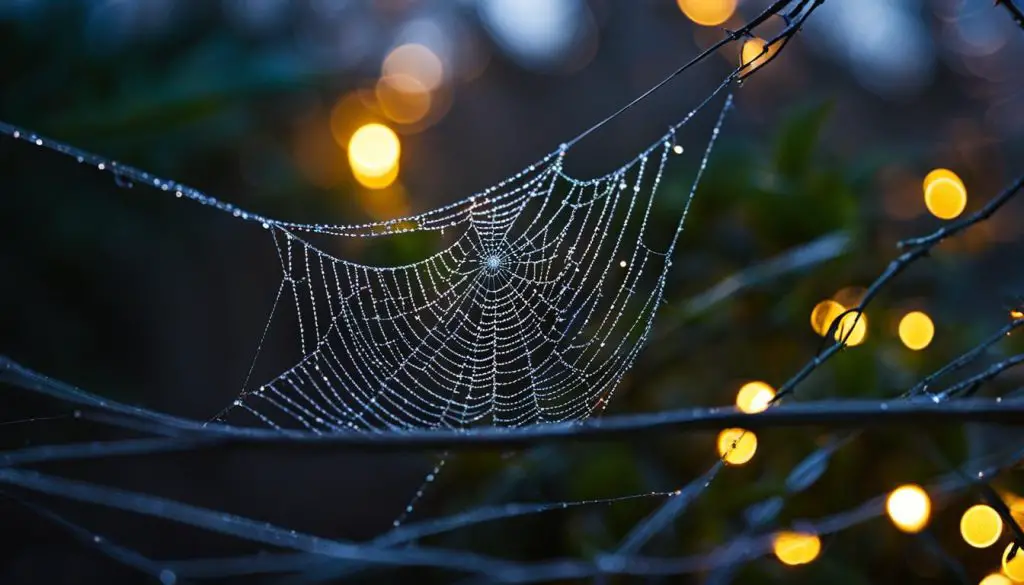
These spider legends and traditions from various corners of the globe remind us of the universal fascination with these eight-legged creatures.
Whether as protectors from evil, matchmakers, or fortune-tellers, spiders continue to captivate our imaginations and serve as symbols of hope, luck, and love in diverse cultures.
Conclusion
As we conclude our exploration of spider symbolism and the myth of finding a spider web on Christmas morning, it becomes clear that spiders hold a special place in human imagination and folklore worldwide.
While the belief in spider webs bringing good luck may vary from culture to culture, the rich tapestry of myths and traditions associated with these creatures is undeniable.
Spiders have been seen as creators and destroyers, bringers of fortune, and symbols of trickery and cunning. Their significance is woven into the fabric of our cultural beliefs and continues to inspire awe and fascination.
So, the next time you come across a spider web on Christmas morning, take a moment to appreciate the complexity and diversity of spider symbolism. Whether it brings luck or not, the presence of a spider web is a reminder of the intricate connections between nature, folklore, and human traditions.
FAQ
Is finding a spider web on Christmas morning considered good luck?
In some cultures, finding a spider web on Christmas morning is believed to bring good luck and fortune.
Where did the tradition of decorating Christmas trees with spider webs originate?
The tradition of decorating Christmas trees with spiderwebs originated in Ukraine. It is. It is based on a legend about a low-income family who woke up on Christmas morning to find a spider that had spun a beautiful web over their tree.
What are some other cultural beliefs and traditions surrounding spiders?
Spiders have been associated with various meanings and interpretations in different cultures. In ancient Egypt, spiders were associated with creation and birth, while in West African folklore, they were seen as trickster gods responsible for mischief and chaos.
Why are spider webs incorporated into Christmas decorations in Germany?
In Germany, spider webs are associated with tinsel, which resembles strands of a spider web. Incorporating spider webs into Christmas decorations is believed to bring good luck and blessings for the holiday season.
What role do spiders play in art and mythology?
Spiders have been depicted in various forms of art and mythology. In ancient Egypt, the goddess Neith, associated with weaving and destiny, was often portrayed with a spider motif. The Moche civilization of Peru incorporated spider images in their artwork, symbolizing prosperity and power.
Are there any other spider legends and traditions from around the world?
Yes, in different cultures, spiders are believed to bring wealth and happiness, serve as matchmaking creatures, and even predict romantic prospects. Spider legends and traditions vary extensively across the globe.
What is the significance of spiders in human folklore and beliefs?
Spiders are significant in human imagination and folklore worldwide, symbolizing creation, destruction, fortune, and cunning. They continue to inspire awe and fascination in various cultural contexts.

